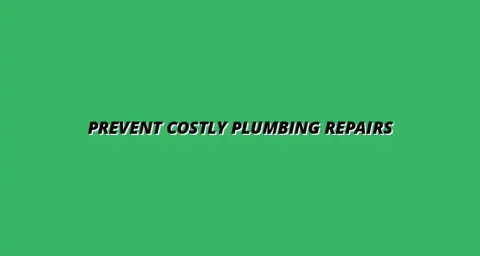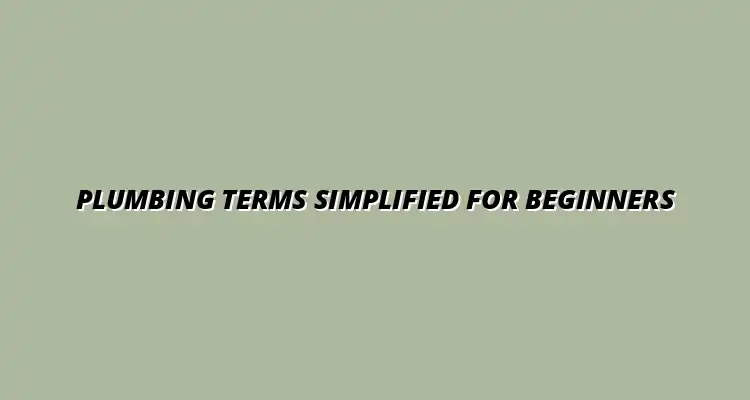
- Beginner Tips
- Feb 12
2024-12-26
When it comes to managing a home, a solid grasp of plumbing terminology can be incredibly beneficial. Being familiar with the language of plumbing can empower homeowners and renters alike, allowing them to communicate effectively with professionals. This knowledge not only aids in maintenance tasks but also helps in understanding issues that may arise within the plumbing system.
Furthermore, knowing the right terms can enhance your confidence when discussing plumbing problems. Whether it’s a leaky faucet or a clogged drain, being able to accurately describe the issue makes it easier for a plumber to provide the right solutions. It can also save you time and money in the long run, ensuring repairs are done efficiently. For example, understanding how to fix a leaky faucet can save you a costly service call.
Understanding plumbing terminology is essential for everyone, especially for homeowners who want to take an active role in their home maintenance. It empowers individuals to identify problems and discuss them effectively with professionals. For instance, if you know the difference between a drainage pipe and a water supply line, you're better equipped to communicate specific concerns. A good understanding of plumbing systems is a great starting point.
Also, being informed can enhance your ability to maintain household fixtures. Knowing how to describe a faucet leak or a running toilet can lead to quicker diagnoses. This not only saves you the headache of waiting for a plumber but also fosters a sense of independence in handling minor plumbing issues. Learning about water heater maintenance, for instance, is a valuable skill.
In order to effectively troubleshoot or discuss plumbing issues, it's crucial to familiarize yourself with common terms used in the field. Understanding the basics can significantly facilitate communication and problem-solving. Here are some essential plumbing terms you should know:
Having a foundational knowledge of these terms not only helps you understand your plumbing system better but also makes it easier to ask questions or seek help. The more comfortable you are with plumbing language, the better you'll be at addressing issues that arise. For example, knowing how to prevent kitchen sink blockages is a huge advantage.
Now that we understand the importance of plumbing knowledge, let’s dive into the essential terms and their meanings. Familiarizing yourself with these terms will provide you with a better understanding of your plumbing system and its components.
Here's a detailed look at some of the key plumbing terms that every beginner should know:
Understanding these terms can greatly enhance your plumbing discussions and maintenance tasks. Each term holds significance in everyday plumbing situations, making them invaluable for anyone looking to improve their home maintenance knowledge! Simple changes, like implementing water-saving plumbing tips, can make a big difference.
Fixtures are critical components of any plumbing system. Whether you're washing your hands or flushing the toilet, these elements play essential roles in daily life. Common fixtures include:
Each fixture comes in various styles and functionalities, making it important to know the basics. Being able to identify and describe the fixtures in your home can help you with repairs and upgrades in the future.
Different types of pipes are used in plumbing systems, each with unique properties and applications. Here’s a brief overview of some common pipe materials:
Understanding the different pipe types can help you make informed decisions during repairs or renovations. This knowledge ensures that you select the right material for your specific plumbing needs!
Having the right tools is essential for any plumbing task. Here are some common tools every homeowner should know:
Familiarizing yourself with these tools can empower you to tackle basic plumbing tasks around your home. Knowing what each tool does makes it easier to perform repairs and maintenance efficiently!
Let’s take a closer look at these essential plumbing tools:
Knowing how to use these tools effectively can save you time and frustration when dealing with plumbing issues. They are the backbone of any DIY plumbing endeavor!
In today’s world, there are many modern plumbing tools and gadgets designed to simplify tasks. Some noteworthy innovations include:
These gadgets not only enhance efficiency but also make plumbing maintenance more manageable for homeowners. By embracing modern technology, you can make your plumbing experience smoother and more effective!
When it comes to plumbing, questions often arise for beginners, and it's essential to have the right answers at your fingertips. Understanding the basics can help you navigate daily plumbing issues with confidence. Let's tackle some of the most common plumbing problems and questions you might encounter! If you're in Birmingham and need a plumber, consider checking out this Tyseley plumber.
Many beginners find themselves puzzled when faced with plumbing issues. Knowing the right questions to ask can make a significant difference in resolving problems quickly. Here are some frequently asked questions that can help clear up some confusion.
A leaky faucet can be both annoying and costly if left unchecked. To address this common issue, start with a few simple steps!
By following these steps, you'll not only save water but also reduce your utility bill. Remember, if the leak persists, it might be time to call in a professional! Low water pressure can also be a problem; here's how to fix low water pressure easily.
Clogged drains are a common headache for many homeowners. Fortunately, there are several preventive measures you can take to keep your drains clear:
Taking these steps can help maintain a healthy plumbing system and prevent unexpected clogs!
Once you've tackled the basics, you might want to dive deeper into plumbing terminology. There are plenty of resources available to help you expand your knowledge and enhance your skills.
If you're serious about learning plumbing, consider enrolling in an online course. Here are a few reputable platforms where you can find helpful courses:
Joining a community of like-minded individuals can be beneficial. Here are some great online communities where you can ask questions and share knowledge:
Understanding plumbing terminology is essential for effective communication with professionals and for tackling everyday plumbing issues. By familiarizing yourself with key terms, you can enhance your problem-solving skills and make informed decisions about home maintenance.
I encourage you to take proactive steps in expanding your plumbing knowledge! Whether through reading, online courses, or joining communities, every bit of learning brings you closer to becoming a confident homeowner. Remember to check out these additional resources for more information!
